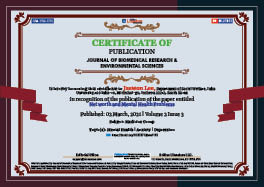Jaewon Lee* and Jennifer Allen
Volume2-Issue3
Dates: Received: 2021-02-17 | Accepted: 2021-03-01 | Published: 2021-03-02
Pages: 095-096
Abstract
Assets and debts and other accumulated wealth should be considered to understand one’s mental health because they influence quality of life over time. Researchers acknowledge limitations of previous studies regarding mental health, which did not consider net worth [1]. Previous studies have mainly addressed Socioeconomic Status (SES) as an indicator influencing mental health [2,3], rather than considering net worth. As a result, the importance of net worth (Wealth and debt) has been growing, and these factors should be included to deeply understand mental health [1].
FullText HTML
FullText PDF
DOI: 10.37871/jbres1195
Certificate of Publication

Copyright
© 2021 Lee J, et al. Distributed under Creative Commons CC-BY 4.0
How to cite this article
Lee J, Allen J. Net worth and Mental Health Problems. J Biomed Res Environ Sci. 2021 Mar 02; 2(3): 095-096. doi: 10.37871/jbres1195, Article ID: jbres1195
Subject area(s)
References
- Drentea P, Reynolds JR. Neither a borrower nor a lender be: the relative importance of debt and SES for mental health among older adults. J Aging Health. 2012 Jun;24(4):673-95. doi: 10.1177/0898264311431304. Epub 2012 Feb 13. PMID: 22330730.
- Braveman PA, Cubbin C, Egerter S, Chideya S, Marchi KS, Metzler M, Posner S. Socioeconomic status in health research: one size does not fit all. JAMA. 2005 Dec 14;294(22):2879-88. doi: 10.1001/jama.294.22.2879. PMID: 16352796.
- Laaksonen M, Rahkonen O, Martikainen P, Lahelma E. Socioeconomic position and self-rated health: the contribution of childhood socioeconomic circumstances, adult socioeconomic status, and material resources. Am J Public Health. 2005 Aug;95(8):1403-9. doi: 10.2105/AJPH.2004.047969. Epub 2005 Jul 7. PMID: 16006419; PMCID: PMC1449373.
- Garcia JA. Borrowing to make ends meet: The rapid growth of credit card debt in America. New York, NY: DÄ“mos Publication Series. 2007:p. 1-32.
- Ferraro KF, Shippee TP. Aging and cumulative inequality: how does inequality get under the skin? Gerontologist. 2009 Jun;49(3):333-43. doi: 10.1093/geront/gnp034. Epub 2009 Apr 17. PMID: 19377044; PMCID: PMC2721665.
- Cockerham WC. Health lifestyle theory and the convergence of agency and structure. J Health Soc Behav. 2005 Mar;46(1):51-67. doi: 10.1177/002214650504600105. PMID: 15869120.
- McCloud L, Dwyer R. The fragile American: Hardship and financial troubles in the 21st century. Sociological Quarterly. 2011 Jan 6;52(1):13-25. doi: 10.1111/j.1533-8525.2010.01197.x
- Zurlo KA, Yoon W, Kim H. Unsecured consumer debt and mental health outcomes in middle-aged and older Americans. J Gerontol B Psychol Sci Soc Sci. 2014 May;69(3):461-9. doi: 10.1093/geronb/gbu020. Epub 2014 Mar 17. PMID: 24637231.
- Loonin D, Renuart E. The life and debt cycle: The growing debt burdens of older consumers and related policy recommendations. Harvard Journal on Legislation. 2007 Dec;44(1):167-203.
- Zhan M. Economic mobility of single mothers: The role of assets and human capital development. Journal of Sociology and Social Welfare. 2006;33(4):127-150.
- Ssewamala FM, Han CK, Neilands TB. Asset ownership and health and mental health functioning among AIDS-orphaned adolescents: findings from a randomized clinical trial in rural Uganda. Soc Sci Med. 2009 Jul;69(2):191-8. doi: 10.1016/j.socscimed.2009.05.019. Epub 2009 Jun 10. PMID: 19520472; PMCID: PMC2819297.
- Riumallo-Herl C, Basu S, Stuckler D, Courtin E, Avendano M. Job loss, wealth and depression during the Great Recession in the USA and Europe. Int J Epidemiol. 2014 Oct;43(5):1508-17. doi: 10.1093/ije/dyu048. Epub 2014 Jun 18. PMID: 24942142; PMCID: PMC4190512.
- Sherraden, M. Stakeholding: Notes on a theory of welfare based on assets. Social Service Review. 1990 Dec;64(4):580-601. doi: 10.1086/603797.
- Meltzer H, Bebbington P, Brugha T, Jenkins R, McManus S, Stansfeld S. Job insecurity, socio-economic circumstances and depression. Psychol Med. 2010 Aug;40(8):1401-7. doi: 10.1017/S0033291709991802. Epub 2009 Nov 11. PMID: 19903366.